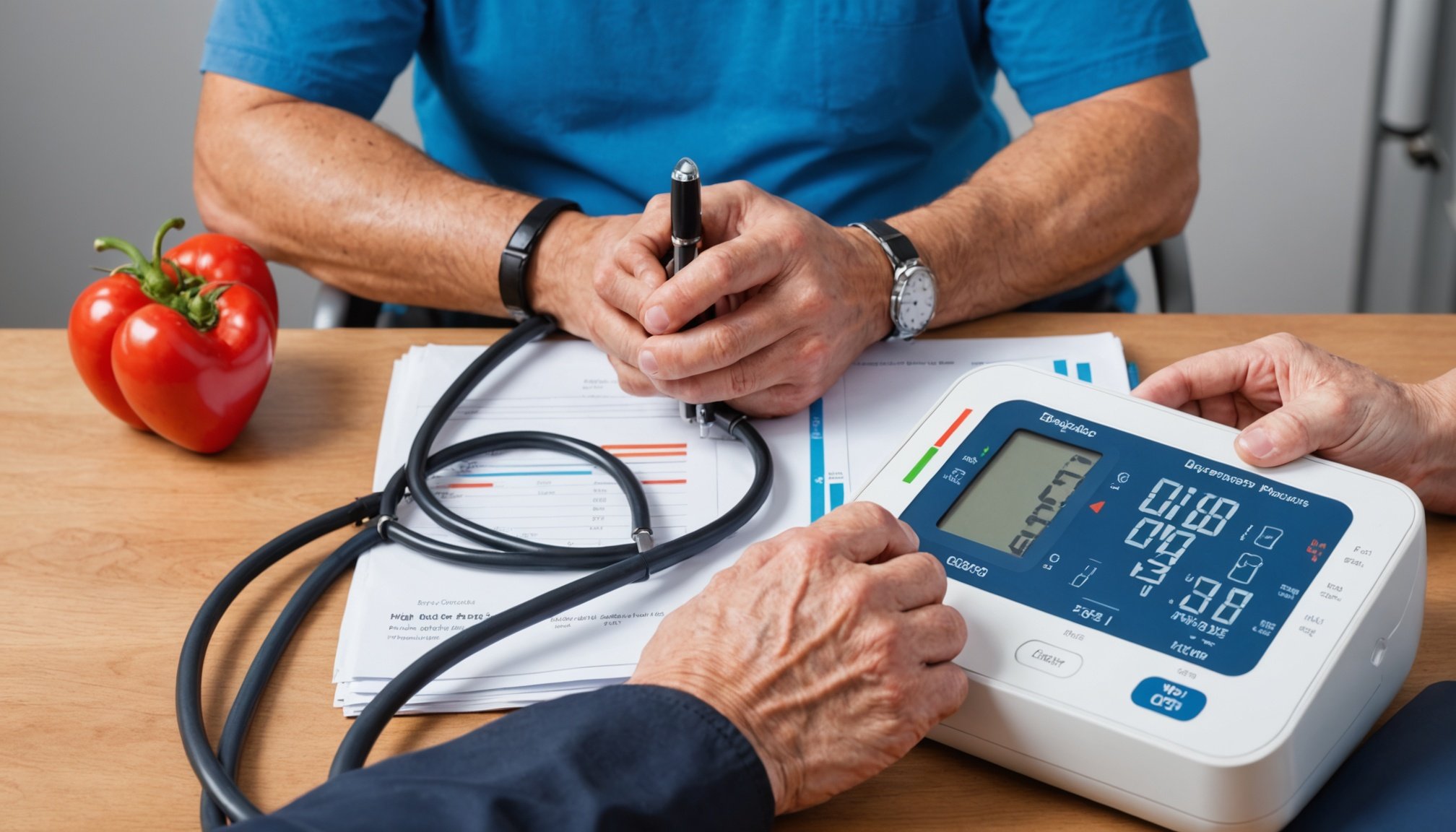Uncovering the Major Causes of High Blood Pressure: Key Risk Factors and Effective Prevention Strategies
High blood pressure, or hypertension, is a silent yet formidable health enemy that affects billions of people worldwide. It is a major risk factor for heart disease, stroke, and kidney disease, among other serious health issues. Understanding the causes and risk factors of hypertension is crucial for developing effective prevention and treatment strategies. In this article, we will delve into the primary and secondary causes of high blood pressure, explore the key risk factors, and discuss practical ways to prevent and manage this condition.
What is High Blood Pressure?
High blood pressure is a condition where the blood vessels have persistently raised pressure. This pressure is created by the force of blood pushing against the walls of the blood vessels (arteries) as it is pumped by the heart. The higher the pressure, the harder the heart has to pump, which can lead to various complications over time.
Have you seen this : Exploring the Effects of Social Media on Body Image and Self-Worth: Unpacking the Connection
Blood Pressure Measurements
Blood pressure is measured in millimeters of mercury (mmHg) and is expressed as two numbers: systolic pressure (the top number) and diastolic pressure (the bottom number). An optimal blood pressure reading is below 120/80 mmHg. Here is a breakdown of the different blood pressure categories:
| Blood Pressure Category | Systolic Pressure | Diastolic Pressure |
|---|---|---|
| Normal | Less than 120 mmHg | Less than 80 mmHg |
| Elevated | 120-129 mmHg | Less than 80 mmHg |
| Stage 1 Hypertension | 130-139 mmHg | 80-89 mmHg |
| Stage 2 Hypertension | 140 or higher mmHg | 90 or higher mmHg |
| Hypertensive Crisis | Higher than 180 mmHg | Higher than 120 mmHg |
Primary (Essential) Hypertension
Primary or essential hypertension is the most common form of high blood pressure, accounting for about 90-95% of all cases. It results from a complex interaction of genetic and environmental factors.
In the same genre : The Impact of Sleep on Shedding Pounds: Unlocking the Secrets to Weight Loss Success
Genetic Factors
Genetic factors play a significant role in primary hypertension. More than 2000 common genetic variants with small effects on blood pressure have been identified. Additionally, some rare genetic variants can have large effects on blood pressure.
Lifestyle and Environmental Factors
Several lifestyle and environmental factors contribute to the development of primary hypertension. These include:
- Excess Salt in the Diet: High sodium intake can lead to increased blood pressure by causing the body to retain fluid and increasing blood volume.
- Obesity: Excess body weight is a significant risk factor for hypertension. Weight loss can help lower blood pressure.
- Smoking: Smoking damages blood vessels and increases blood pressure. Quitting smoking can help reduce this risk.
- Physical Inactivity: Regular physical activity can help lower blood pressure and improve overall cardiovascular health.
- Alcohol Use: Excessive alcohol consumption is associated with higher blood pressure. Reducing alcohol intake can help manage blood pressure.
- Dietary Factors: A diet high in saturated fats, trans fats, and cholesterol, and low in fruits, vegetables, and whole grains, can increase the risk of hypertension. Increasing dietary potassium, calcium, and magnesium can help lower blood pressure.
Secondary Hypertension
Secondary hypertension accounts for about 5-10% of all cases and is caused by an identifiable underlying condition.
Common Causes of Secondary Hypertension
- Kidney Disease: Kidney disease is the most common cause of secondary hypertension. Conditions such as chronic kidney disease, renal artery stenosis, and glomerulonephritis can all contribute to high blood pressure.
- Endocrine Conditions: Conditions like Cushing’s syndrome, hyperthyroidism, hypothyroidism, and hyperaldosteronism can cause secondary hypertension.
- Sleep Apnea: Obstructive sleep apnea is a known risk factor for secondary hypertension.
- Medications and Substances: Certain medications, such as birth control pills, cold remedies, and stimulants like cocaine and methamphetamine, can cause secondary hypertension.
Key Risk Factors for Hypertension
Understanding the risk factors for hypertension is crucial for prevention and early intervention.
Modifiable Risk Factors
- Dietary Habits:
- High sodium intake
- Low intake of fruits and vegetables
- High consumption of saturated fats and trans fats
- Low intake of potassium, magnesium, and calcium
- Physical Inactivity: Regular physical activity can help lower blood pressure and improve cardiovascular health.
- Smoking: Smoking is a significant risk factor for hypertension and cardiovascular disease.
- Alcohol Consumption: Excessive alcohol intake can increase blood pressure.
- Obesity: Maintaining a healthy weight through diet and exercise can help manage blood pressure.
Non-Modifiable Risk Factors
- Age: The risk of developing hypertension increases with age.
- Family History: A family history of hypertension increases an individual’s risk.
- Race: Hypertension is more prevalent and severe among African Americans.
- Co-existing Diseases: Conditions like diabetes and kidney disease can increase the risk of hypertension.
Effective Prevention Strategies
Preventing hypertension involves a combination of lifestyle changes, dietary adjustments, and regular health checks.
Lifestyle Changes
- Regular Physical Activity: Engaging in at least 150 minutes of moderate-intensity aerobic physical activity or 75 minutes of vigorous-intensity aerobic physical activity per week can help lower blood pressure.
- Healthy Diet: Adopting a diet rich in fruits, vegetables, whole grains, and lean proteins, and low in saturated fats, trans fats, and sodium can help manage blood pressure. The DASH (Dietary Approaches to Stop Hypertension) diet is often recommended.
- Weight Management: Maintaining a healthy weight through a combination of diet and exercise can help reduce the risk of hypertension.
- Stress Reduction: Managing stress through techniques like meditation, yoga, or deep breathing exercises can help lower blood pressure.
Dietary Adjustments
- Reduce Sodium Intake: Limiting sodium intake to less than 2,300 milligrams per day can help lower blood pressure. Further reduction to 1,500 milligrams per day is recommended for those with high blood pressure or those at risk for it.
- Increase Potassium Intake: Potassium helps balance the effects of sodium and can lower blood pressure. Foods rich in potassium include bananas, leafy greens, and sweet potatoes.
- Stay Hydrated: Drinking enough water is essential for overall health and can help manage blood pressure.
Treatment and Management
For those already diagnosed with hypertension, effective treatment and management are crucial to prevent complications.
Non-Drug Therapy
- Dietary Management: Following a healthy diet, reducing sodium intake, and increasing potassium, magnesium, and calcium intake can help manage blood pressure.
- Regular Exercise: Engaging in regular physical activity can help lower blood pressure and improve overall cardiovascular health.
- Weight Reduction: Losing weight if overweight or obese can significantly help in managing blood pressure.
- Smoking Cessation: Quitting smoking can reduce the risk of cardiovascular disease and help manage blood pressure.
- Reduced Alcohol Intake: Limiting alcohol consumption can help manage blood pressure.
Medications
For many people, lifestyle changes alone may not be sufficient to control blood pressure, and medication may be necessary.
- Diuretics: These medications lower blood pressure by reducing body fluids and thereby reducing peripheral resistance to blood flow. However, they deplete the body’s supply of potassium, so potassium supplements or potassium-sparing diuretics may be recommended.
- Beta-Adrenergic Blockers (Beta-Blockers): These medications block the effects of epinephrine (adrenaline), easing the heart’s pumping action and widening blood vessels.
- Vasodilators: These medications relax smooth muscle in the walls of blood vessels, allowing small arteries to dilate and thereby decreasing total peripheral resistance.
- Calcium Channel Blockers: These medications promote peripheral vasodilation and reduce vascular resistance.
Complications of Untreated Hypertension
Untreated hypertension can lead to severe and potentially life-threatening complications.
Heart Disease
- Heart Attack: High blood pressure can cause the arteries to become rigid, inelastic, and blocked by accretions of cholesterol, leading to a heart attack.
- Heart Failure: The heart muscle may become weakened due to the increased workload, leading to heart failure.
- Cardiac Arrest: This is an electrical problem triggered by a disruption of the heart’s pulse rhythm and can be fatal if not treated promptly.
Stroke and Kidney Disease
- Stroke: High blood pressure can cause strokes by blocking or bursting arteries that supply blood and oxygen to the brain.
- Kidney Disease: High blood pressure can cause weakened or narrowed blood vessels in the kidneys, leading to kidney damage and potentially kidney failure.
Other Complications
- Eye Disease: High blood pressure can cause damage to the tiny blood vessels in the eyes, leading to vision problems and potentially permanent vision loss.
- Mental Difficulties: Uncontrolled high blood pressure can undermine cognitive function and increase the risk of vascular dementia.
- Sexual Dysfunction: Reduced blood flow to the genital area can cause erectile dysfunction and lowered libido.
Hypertension is a complex and multifaceted condition that requires a comprehensive approach to prevention and management. By understanding the primary and secondary causes, identifying key risk factors, and implementing effective lifestyle changes and treatment strategies, individuals can significantly reduce their risk of developing hypertension and its associated complications. As the American Heart Association emphasizes, “High blood pressure is a major public health issue that affects millions of people worldwide. By working together, we can reduce the burden of this disease and improve the health and well-being of individuals and communities.”
In the words of Dr. Mariell Jessup, a cardiologist at the Mayo Clinic, “The key to managing high blood pressure is to make healthy lifestyle choices and to work closely with your healthcare provider to find the right treatment plan for you.”
By taking proactive steps to manage blood pressure, people can help ensure a healthier heart and a longer, more fulfilling life.











